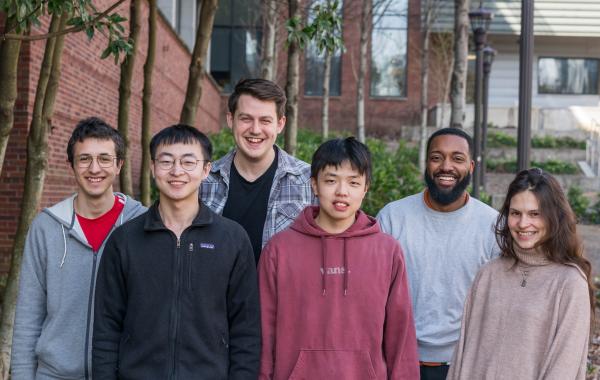Getting to know the 2023 QBioS Cohort

(Left to Right) - Luis Felipe Cedeno Perez, Shu Gong, Ben Doshna, Jianfeng Lin, Tre Thomas, Kseniia Shilova
The Quantitative Biosciences graduate program is thrilled to introduce this year’s class of first-year PhD students. These students are currently busy with two rotations this semester, as well as planning the 2024 Hands-On Workshop.
Luis Felipe Cedeño Pérez earned his bachelor’s in Genomic Sciences from the National Autonomous University of Mexico (UNAM, in Spanish) in Queretaro, Mexico. During his undergraduate studies, he developed a bioinformatic tool to analyze the conservation of SARS-CoV-2 genomes and did a 1-year internship in Dr. William’s Ratcliff lab to study the evolution of multicellularity. The first one gave him an appreciation of the power and importance of computational tools in research. The second one helped him discover his interest in studying evolution and found a laboratory in which to pursue a PhD. “I did not only choose the QBioS program to continue working in Dr. Ratcliff’s lab but also because I felt that the program is one of the few places where I could continue learning how to do multidisciplinary research, as my undergrad is a multidisciplinary program. And after spending a year at Georgia Tech and meeting and interacting with members of the program, I knew this was the place where I wanted to study.”
Ben Doshna graduated from Temple University in 2023 with a bachelor's degree in Bio Engineering. During his undergraduate studies he started by working in a lab that aimed to develop classification models for whole slide pathology images, but he found his true passion after starting to explore the comparative biomechanics of animal locomotion. He is excited to further develop this passion at Georgia Tech. "The opportunity to develop a strong quantitative framework to analyze biological systems was everything I was looking for in a graduate program."
Shu Gong graduated from Sichuan University, China, with a Bachelor of Software Engineering and a minor in Biology. During his undergraduate studies, he enjoyed combining his computational and experimental skills in various research areas like neuroscience and robotics. He first studied at Georgia Tech Shenzhen for a year as a Master’s student and then moved to the US to join the QBioS PhD program. Shu says, “I was lucky to find the QBioS program. It provides the best support and resources for students who want to succeed in their academic careers.”
Jianfeng Lin earned his bachelor’s in mechanical engineering from Wuhan University, China. Early in his undergraduate studies, he worked on variable stiffness of soft actuation and grasping. After that, he was advised by Dr. Alexander Badri-Sprowitz with a focus on joint-tendon robot models to study the biomechanics of birds. He designed a duck leg model with coupled tendons and elasticity to discover the paddling efficiency brought by such a coupling joint-tendon model. "I really enjoy the way to use theoretical and robot models to study complex biological locomotion. These deterministic approaches give us a chance to uncover the secrets behind beautiful biological systems. The QBioS program at Georgia Tech is a highly Interdisciplinary program, where I can cultivate skills and work with incredible faculty and students in different fields to pursue my research interest."
Kseniia Shilova graduated from Higher School of Economics, Moscow with a Bachelor of Software Engineering. During her undergraduate education in Russia, Kseniia became interested in computational neuroscience. Her primary projects were focused on the Topological Data Analysis which is applied to both structural and functional brain data. This experience of working in the Algebraic Topology laboratory and doing research applied to neuroscience motivated Kseniia to join a PhD program in the United States. For Kseniia, QBioS at Georgia Tech was the top choice, because QBioS offers an excellent opportunity to conduct research in a biology-related field, but at the same time be very close to computational sciences. "Before I did mathematics and programming to get a powerful tool for the exploration of the real world, and now I want to apply this tool being a part of QBioS community".
With 10 years of funding, as a recipient of the Bill & Milinda Gates Scholarship, Tremond Thomas chose to go to Morehouse College for his undergraduate studies. After 5 years, he graduated from Morehouse College in 2021 with a degree in physics and minor in math. While at Morehouse, Tre completed two summer internships at GT. Freshman year he worked on photoacoustic and ultrasound imaging. Junior year he returned for another internship, this time in Dr. Yunker's lab where he did some Evolution of Multicellularity work. Tre continued to remotely work in Dr. Yunker's lab, analyzing data pertaining to antibiotic resistance. After graduating, he took two years off to work in education consulting, to then return and join the QBioS program. “‘People are an organization's most valuable asset and key to their success.’ I chose QBioS because of its culture. Those who run the program and are a part of it, have this sort of gravitational pull about them. Let's you know you are in good hands. which is crucial to your success.”
